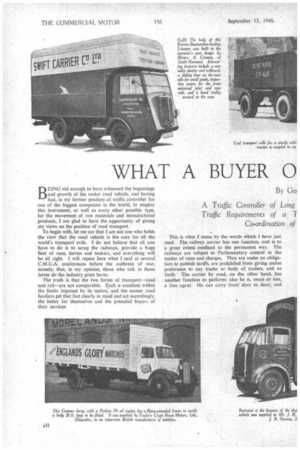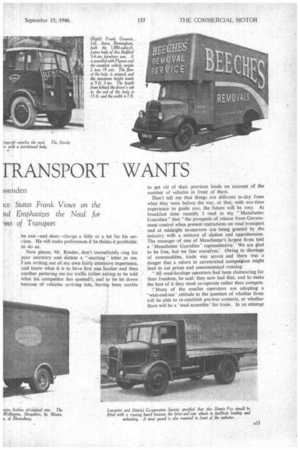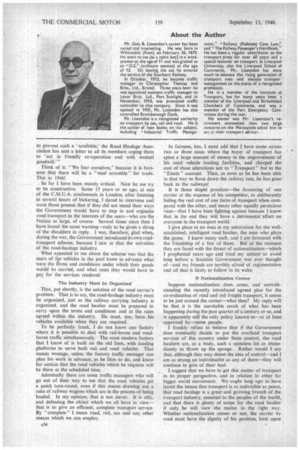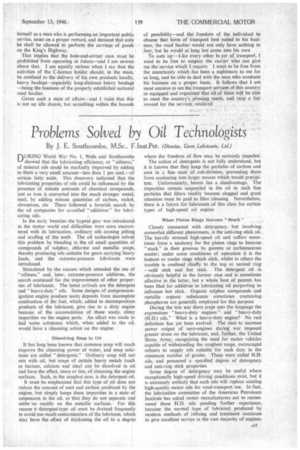WHAT A BUYER 0 FRANSPORT WANTS
Page 34

Page 35

Page 36

Page 37

If you've noticed an error in this article please click here to report it so we can fix it.
By Gel ssenden A Traffic Controller of Long Traffic Requirements of a 7 Co-ordination of
ice States Frank Views on the nd Emphasizes the Need for of Transport BEING old enough to have witnessed the beginning,, and growth of the motor road vehicle, and having had, in my former position of traffic controller for one of the biggest companies in the world, to employ this instrument, as well as every other possible type, for the movement of raw materials and manufactured
• products, I am glad to have the opportunity of giving my views on the position of road transport.
To begin with, let me say that I am not one who holds the view that the road vehicle is the cure for all the world's transport evils. I do not believe that all you have to do is to scrap the railways, provide a huge fleet of vans, lorries and tankers, and everything will be all right I will repeat here what I said at several C.M.U.A'. conferences before the outbreak of war, namely, that, in my opinion, those who talk in those terms do the industry great harm.
The truth is that the two forms of transport—road and rail—are not comparable. Each is excellent within the limits imposed by its nature, and the sooner road hauliers get that fact clearly in mind and act accordingly, the better for themselves and the potential buyers Of their services.
This is what I mean by the words which I have just used. The railway carrier has one function, and is to a great extent confined to the permanent way. The railways are subject to Parliamentary control in the matter of rates and charges. They are under an obligation to publish tariffs, are prohibited from giving undue preference to any trader or body of traders, and so forth. The carrier by road, on the other hand, has another function to perform: also he is, more or less, a free agent. He can carry from' door to door, and vices. He will make preferences if he thinks it profitable. he can—and does—charge a little or a lot for his serto do so.
Now please, Mr. Reader, don't immediately ring for your secretary and dictate a "snorting" letter ,to me. I am writing out of my own fairly extensive experience, and know what it is to have first one haulier and then another pestering me for traffic (often asking to be told what his competitor has quoted!), and to be let down because of vehicles arriving late, having been unable to get rid of their previous loads on account of the number of vehicles in front of them.
Don't tell me that things are different to-day from what they were before the war, or that, with war-time experience to guide you, the future will be rosy. At breakfast time recently I read in my " Manchester Guardian" that "the prospects of release from Government control when present restrictions on road transport end at midnight to-morrow are being greeted by the industry with a mixture of elation and apprehension. The manager of one of ManchestFr's largest firms told a Manchester Guardian' representative: 'We are glad to be free, but we fear ourselves.' Owing to shortage of commodities, trade was scarce and there was a danger that a return to unrestricted competition might lead to cut prices and uneconomical running. "All road-haulage operators had been clamouring for their freedom, he said; they now had that, and to make the best of it they must co-operate rather than compete.
I` Many of the smaller operators are adopting a 'wait-and-sec' attitude to the question of whether firms will be able to re-establish pre-war contacts, or whether there will be a 'mad scramble' for trade. In an attempt
to prevent such a scrdnahle,' the Road Haulage Association has sent a letter to all its members urging them to 'act in friendly co-operation and with mutual goodwill."
Think of it: "We fear ourselves," because it is foreseen that there will be a "mad scramble" for trade. This in 1946!
So far I have been mainly critical. Now let me try to be constructive. Some 15 years or so ago, at one of the CACCIA. conferences in London, after listening to several hours of bickering, I dared to intervene and warn those present that if theydid not mend their ways the Government would have to step in and organize road transport in the interests of the users—who are the Nation at large, of course. Several times since then I have issued the same warning—only to be given a shrug of the shoulders in reply. I was, therefore, glad when, during the war, the Government introduced its own roadtransport scheme, because I saw in that the salvation of the road-haulage industry.
What appealed to me about the scheme was that the users of the vehicles in the poot knew in advance what were the terms and conditions under which their goods would be carried, and what rates they would have to pay for the services rendered.
The Industry Must be Organized
That, put shortly, is the solution of the road carrier's problem. That is to say, the road-haulage industry must be organized, just as the railway carrying industry is organized, and the road haulier must be prepared to carry upon the terms and conditions and at the rates agreed within the industry. He must, too, have his vehicles available when they are required.
To be perfectly frank, I do not know one factory where it is possible to deal with rail-borne and roadborne traffic simultaneously. The most modern factory that I know of is built on the old lines, with loading platforms to serve both rail and road vehicles. That means wastage, unless the factory traffic manager can plan his work in advance, as he likes to do. and know for certain that the road vehicles which he requires will he there at the scheduled time.
Admittedly there are some traffic managers who will go out of their. way to see that the road vehicles get a quick turn-round, even if this Means drawing out a rake of railway wagons which are in the process of being loaded. In my opinion, that is not clever. It is silly, and defeating the object which we all have in view— that is to give an efficient, complete transport service. By "complete" I mean road, rail, sea and any other means which we can employ. In fairness, too, I must add that I have come acrdss two or three cases where thg buyer of transport has spent a large amount of money in the improvement of his road vehicle loading facilities, and charged the cost of these alterations not to "Transport" but to the "Estate" account. Then, as soon as he has been able in that way to force down the railway rate, be has gone back to the railways!
It is those stupid practices—the favouring of one carrier at the expense of his competitor, or deliberately hiding the real cost of one form of transport when compared with the other, and many other equally pernicious vices—that I have been fighting against because I know that in the end they will have a detrimental effect on everyone in the transport world.
I give place to no man in my admiration for the wellestablished, intelligent road haulier, the man who plays the game. I know many such, and I am favoured with the friendship of a few of them. But at the moment they are faced with the threat of nationalization—which I prophesied years ago and tried my utmost to avoid long before a Socialist Government was ever thought of—and my friends are terribly afraid of regimentation and all that is likely to follow in its wake.
If Nationalization Comes Suppose nationalization .does come, and notwithstanding the recently introduced agreed plan for the co-ordination of road and rail freight transport, it seems to be just around the corner—what then? My reply will be that it is the inevitable result of what has been happening during the past quarter of a century or so, and is apparently still the only policy known to—or at least approved by—some people.
I frankly refuse to believe that if the Government does eventually decide to put the overland transport services of this country under State control, the road hauliers are, as a body, such a spineless lot as immediately to throw up the sponge. Rather would I say that, although they may detest the idea of control—and I am as strong an individualist as any of them—they will continue to give of their best.
I suggest that we have to get this matter of transport in its proper perspective, and in relation to other far bigger world movements. We ought long ago to have learnt the lesson that transport is as indivisible as peace, that road haulage is a great and growing branch of the transport industry, essential to the peoples of the world, and that there is plenty of scope for the road haulier if only he will view the matter in the right way. Whether nationalization comes or not, the carrier by road must have the dignity of his position, look upon
himself as a man who is performing an important public service, insist on a proper reward, and demand that only he shall be allowed to perform the carriage: of goods on the King's Highway.
That implies that the hole-and-coener man must be prohibited from operating in future—and I am serious about that. I am equally serious when I say that the activities of the C-licence holder should, in the main, be confined to the delivery of his own products locally, heavy haulage—especially long-distance heavy haulage --being the business of the properly established national road haulier.
Given such a state of affairs—and I insist that this is not an idle dream, but something within the bounds of possibility—and the freedom of the individual to choose that form of transport best suited to his business, the road haulier would not only have nothing to ,fear, but he would at long last come into his own To sum up:—Like every other In yer of transport, want to be free to employ the carrier who can give me the service which I require I want to be free from the uncertainty which has been a nightmare to me for so long, and be able to deal with the man who conducts his business on a proper basis. It follows that I am most anxious to see the transport services of this country so equipped and organized that all of them will be able to meet the country's pressing needs, and reap a fair reward for the services, rendered.




































































